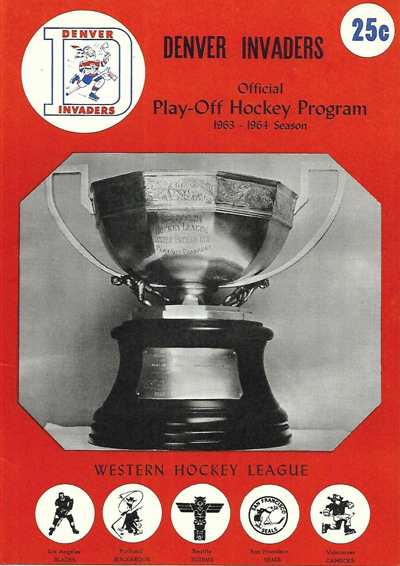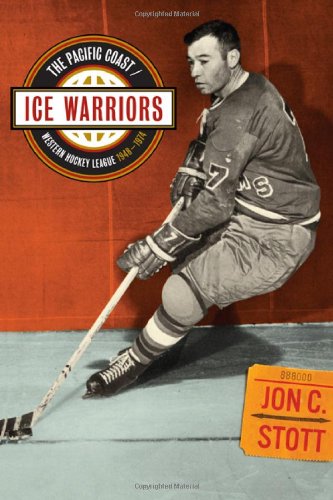Western Hockey League (1963-1964)
Tombstone
Born: June 4, 1963 – The Spokane Comets relocate to Denver, CO
Moved: June 25, 1964 (Victoria Maple Leafs)
First Game: October 10, 1963 (L 4-1 vs. Portland Buckaroos)
Last Game: April 4, 1964 (L 5-3 vs. Los Angeles Blades)
Lester Patrick Cup Championships: None
Arena
Denver Coliseum
Opened: 1951
Marketing
Team Colors:
Ownership & Affiliation
Owners: Toronto Maple Leafs (C. Stafford Smythe, Harold Ballard, John Bassett) & Don Bolger, Robert Scarlett, Etienne Perenyi, Neil Cullen, et al.
NHL Affiliation: Toronto Maple Leafs
Attendance
Tilting your mobile device may offer better viewing.
Source: UNITED PRESS INTERNATIONAL. “Denver to Lose WHL Spot As Smythe Says Champs Will Move To New Town”. The Enterprise-Record (Chico, CA). June 26, 1964 (Invaders attendance figure)
Background
The Denver Invaders were an outstanding minor league hockey club that played one season in the Western Hockey League (WHL) during the winter of 1963-64. The Invaders relocated to Denver from Spokane, Washington the previous spring and served as a farm club of the NHL’s Toronto Maple Leafs.
The well-stocked team was terrific on the ice, dominating the WHL with a 44-23-3 regular season record. But lackluster attendance at the Denver Coliseum and disputes between local investors and the Maple Leafs led the franchise to leave Colorado within a year of arriving.
On The Ice
The Invaders roster was fully stocked by the Toronto Maple Leafs, who owned a majority stake in the franchise after purchasing the WHL’s Spokane Comets club in June 1963.
In July, Denver landed a top flight head coach in 49-year old Rudy Pilous. Just two years earlier, Pilous led the Chicago Black Hawks to victory in the 1961 Stanley Cup finals. Chicago’s 1961 championship was the only Stanley Cup during the “Original Six” era of 1942-1967 won by a team other than the Montreal Canadiens, Detroit Red Wings or Toronto Maple Leafs. But the Black Hawks fired Pilous in May 1963, despite Chicago finishing just a single point behind Toronto for first place in the NHL standings that season.
“For years I’ve been trying to beat the Leafs. Now I’m finally joining them.” Pilous announced upon his appointment.1CANADIAN PRESS. “Pilous Bound For Denver”. The Journal (Edmonton, AB). July 11, 1963
Pilous’ squad ran roughshod over the rest of the six-member WHL in 1963. With 44 wins in 70 games, the Invaders won 11 more games than the Portland Buckaroos, who finished far behind Denver in 2nd place during the regular season. NHL veteran winger Lou Jankowski led the WHL in scoring with 41 goals. Goaltender Al Millar put on an ironman performance, playing all seventy games between the pipes.
In the opening round of the Lester Patrick Cup playoffs against the 3rd place Los Angeles Blades, however, the wheels came off. Injuries hobbled the Invaders throughout the series. Most significantly, Al Millar broke his hand in Game 3 in L.A. This created a strange situation where the Invaders brought in Marcel Paille of the last place Vancouver Canucks, who had been designated as the league’s “standby” goaltender for the league’s four playoff qualifying teams. Paille helped rally the Invaders to a road victory in Game 4 to even the series at two games. But the Blades won in overtime in Game 5 and then polished off the Invaders at the Denver Coliseum in Game 6 to pull off a stunning upset.
Move to Victoria
Despite the Invaders’ superb regular season, attendance was modest at the Coliseum. Denver drew 105,317 fans for 35 home dates in 1963-64 for an average of only 3,012 per game.
While the Toronto Maple Leafs held the controlling 64% interest in the Invaders, the team also had a quartet of local investors that owned 36% of the team. In May 1964 local stockholder Don Bolger headed up a “Save the Invaders” season ticket drive to secure 2,000 ticket pledges for the 1964-65 season. With the pledge drive still ongoing and making progress in June, Maple Leafs boss Stafford Smythe flew into Denver. He announced the team would leave town for Victoria, British Columbia and swiftly flew back to Toronto.
Aftermath
Despite some saber rattling from the local investor group, the die was cast. The Invaders moved to British Columbia and became the Victoria Maple Leafs in 1964. Rudy Pilous moved to Victoria with the club, along with goaltender Al Millar and top scorers Lou Jankowski, John Sleaver and Gord Redahl. The team remained outstanding in Victoria, advancing the to the playoffs finals in each of the next two seasons and winning the Lester Patrick Cup as champions of the WHL in 1966.
In 1968 the Western Hockey League returned to Denver and the Coliseum with the formation of the Denver Spurs club. Rudy Pilous returned to coach the Spurs for three seasons from 1968 to 1971.
Bill Collins enjoyed the longest NHL career of any Invader alumnus. The centerman appeared in 768 games with seven teams over an 11-year career between 1967 and 1978,
Bill Flett, who appeared in a single playoff game as an emergency injury replacement in the spring of 1964, was the last Invader veteran to play pro hockey when he appeared in 20 games for the Edmonton Oilers during the 1979-80 NHL season.
Denver Invaders Shop
Editor's Pick
ICE WARRIORS
The Pacific Coast/Western Hockey League 1948-1974
By Jon C. Stott
Between 1948 and 1974, more than 2,500 minor-league professional hockey players skated across the Pacific Northwest states and western Canada as part of the 23 teams that made up the Western Hockey League (known as the Pacific Coast Hockey League before 1952). Some of the young players went on to enjoy careers in the National Hockey League; others were former NHLers willing to extend their careers by returning to the minors. Many of the most colorful, however, were minor-league “lifers” who simply had hockey in their blood and built their reputations in the WHL and other minor pro leagues.Ice Warriors traces the WHL’s origins, rise and fall, and includes interviews with players, coaches and fans as well as statistical records and pictures from the era.
When you make a purchase through an affiliate link like this one, Fun While It Lasted earns a commission at no additional cost to you. Thanks for your support!
[auction-nudge tool=”listings”]
In Memoriam
Invaders Head Coach Rudy Pilous was inducted into the Hockey Hall of Fame in the “Builder” category in 1985. died of of a heart attack in his home on December 5, 1994 at the age of 80. New York Times obituary.
Links
##



One Response
I was at a few of those invaders games as my father was the team dentist. I still have my Denver invaders patch 60+ years later. I remember coach Pilous. My father used to invite players for dinner and coach Pilous came a couple times. This was when he was coaching the Spurs. Players, including the goalie , didn’t wear helmets back in the day. My father was always busy during games!